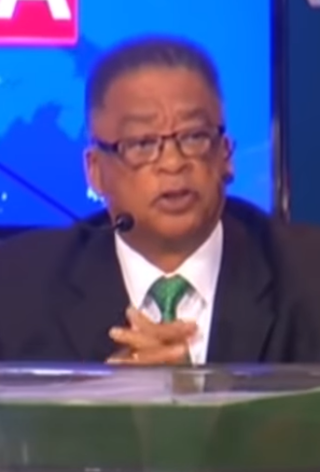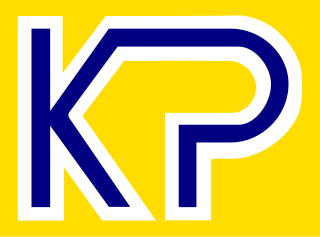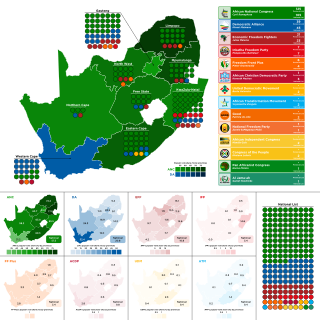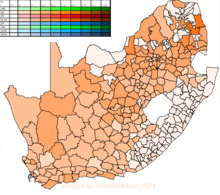
The Democratic Alliance (DA) is a South African political party which is a part of the current South African Government of National Unity (GNU). The party has been the second-largest in South Africa since its foundation in 2000. The party is broadly centrist, and has been attributed both centre-left and centre-right policies. It is a member of Liberal International and the Africa Liberal Network. The DA traces its roots to the founding of the anti-apartheid Progressive Party in 1959, with many mergers and name changes between that time and the present. The DA has a variety of ideologically liberal tendencies, including neoliberalism, social liberalism, classical liberalism, and conservative liberalism. The party draws its support predominantly from Afrikaans and English speakers, people aged over 35, and white South Africans, as well as the Indian and Coloured communities.

Petrus Jacobus "Peter" Marais is a retired South African politician who served as a Member of the Western Cape Provincial Parliament.

The Conservative Party was a far-right South African political party that sought to preserve many aspects of apartheid in the system's final decade, and formed the official opposition in the white-only House of Assembly in the last seven years of minority rule. It declined quickly after apartheid ended, before being merged with the Freedom Front in 2004.

General Constand Laubscher Viljoen was a South African Army officer and politician. He co-founded the Afrikaner Volksfront and later founded the Freedom Front. He is partly credited with having prevented the outbreak of armed violence by disaffected white South Africans prior to post-apartheid general elections.

A Volkstaat, also called a Boerestaat, is a proposed White homeland for Afrikaners within the borders of South Africa, most commonly proposed as a fully independent Boer/Afrikaner nation. The proposed state would exclude Afrikaans-speaking Coloureds but accept South Africans of English ancestry and other White South Africans, if they accept Afrikaner culture and customs.

Pieter Willem Adriaan Mulder is a South African politician and the former leader of the Freedom Front Plus. He served as the Deputy Minister of Agriculture, Forestry and Fisheries in the Cabinet of President Jacob Zuma from 2009–14.
Although the Democratic Alliance of South Africa in its present form is fairly new, its roots can be traced far back in South African political history, through a complex sequence of splits and mergers.

The Cape Independence Party (CAPEXIT), previously called the Cape Party, is a political party in South Africa which seeks to use all constitutional and legal means to bring about Cape independence, which includes the entire Western Cape, Northern Cape, six municipalities in the Eastern Cape, and one municipality in the Free State. The area includes all municipalities in those provinces with an Afrikaans-speaking majority. In 2009, it was claimed to have had a membership of approximately 1,000 people across South Africa, but official membership figures are not made public. The party currently holds two seats on the Cape Town City Council.

General elections were held in South Africa on 8 May 2019 to elect a new President, National Assembly and provincial legislatures in each province. These were the sixth elections held since the end of apartheid in 1994 and determined who would become the next President of South Africa.
The Accord on Afrikaner self-determination is a South African political accord that recognises the right of the Afrikaner people on self-determination. The accord was signed by the Freedom Front, the African National Congress and the National Party-led South African government on 23 April 1994.

Petrus Johannes "Pieter" Groenewald is a South African politician who is currently serving as Minister of Correctional Services since July 2024. He has served as the Leader of the Freedom Front Plus since his election in November 2016. He started his political career by being elected Mayor of Stilfontein in 1988. He relinquished the position in 1989 due to his election to the House of Assembly. Groenewald co-founded the Freedom Front in 1994, and served as a Member of the National Assembly until his election to the North West Provincial Legislature in 1999. He returned to the National Assembly in 2001.

The 2019 Western Cape provincial election was held on 8 May 2019 to elect the 6th Western Cape Provincial Parliament. It was the sixth provincial election held since the establishment of the provincial legislature in 1994.

Lennit Hendry Max is a South African politician, advocate and police officer who served as a Member of the Western Cape Provincial Parliament, as Shadow Deputy Minister of Correctional Services (2010–2014), as Member of the National Assembly (2010–2014) and as Western Cape Provincial Minister of Community Safety (2009–2010).

The Electoral Commission of South Africa (IEC) announced on 20 March 2019 that a record number of 48 parties had registered candidates for the national parliamentary election. This is 19 more parties that contested the 2014 national elections. In the provincial legislature elections, the total number of parties registering candidates were:

The 2021 South African Municipal Elections were held on 1 November 2021, to elect councils for all district, metropolitan and local municipalities in each of the country's nine provinces. Being the 6th municipal election held in South Africa since the end of apartheid in 1994. These held - since then -every five years. The previous municipal elections were held in 2016. On 21 April 2021, President Cyril Ramaphosa announced the elections to be held on Wednesday, 27 October 2021. It had been recommend by Dikgang Moseneke to delay the municipal elections until 2022. The Electoral Commission of South Africa (IEC) requested the Constitutional Court to support the date postponement. The Economic Freedom Fighters (EFF) supported the date postponement while the Democratic Alliance (DA) was against the postponement of the date. The Constitutional Court dismissed the application to postpone the date until 2022, ruling that they had to take place between 27 October and 1 November. On 9 September 2021, the Minister of Cooperative Governance and Traditional Affairs, Nkosazana Dlamini-Zuma announced that the elections would be held on 1 November.
Marcelle Frieda Maritz was a South African politician who served as a Member of the Limpopo Provincial Legislature sfrom 2019 until 2024. She was a member of the Freedom Front Plus (FF+) and the party's provincial leader. She served as a municipal councillor of the Mogalakwena Local Municipality prior to her appointment to provincial legislature. Maritz was a member of the Democratic Alliance (DA) until 2015, when she resigned from the party after allegations of racism. The DA soon laid criminal charges regarding racism against her in 2019.
Ignatius Michael "Michal" Groenewald is a South African politician who was elected to the North West Provincial Legislature in the 2024 provincial election. A member of the Freedom Front Plus (FF+), he is the party's provincial leader in the North West. Groenewald's father Pieter is the national leader of the Freedom Front Plus. He was previously a municipal councillor in the Matlosana Local Municipality and a member of parliament.
The 2019 Northern Cape provincial election was held on 8 May 2019 to allocate the 30 seats of the Northern Cape Provincial Legislature. Like all the South African provincial elections, it was held on the same day as the South African general election. 21 political parties participated in the election, of which only the African National Congress, Democratic Alliance, Economic Freedom Fighters, and Freedom Front Plus won seats. The ANC lost two seats, but maintained a majority.
The 2024 Northern Cape provincial election was held on 29 May 2024 to allocate the 30 seats of the Northern Cape Provincial Legislature. Like all the South African provincial elections, it was held on the same day as the South African general election. 24 political parties participated in the election, of which only the African National Congress, Democratic Alliance, Economic Freedom Fighters, Patriotic Alliance and Freedom Front Plus (VF+) won seats. The ANC lost three seats and lost its outright majority, while remaining the largest party at 15 seats. The DA lost one seat, the EFF gained one, and the VF+ retained its single seat, while the new PA won three.




















